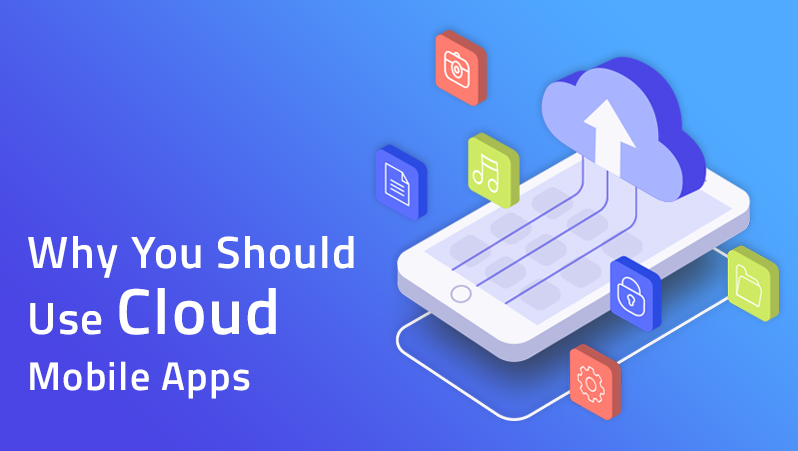The mobile era is truly here, as mobile users have outnumbered the desktop users. Similarly, more businesses have started migrating to mobile platform from the desktop platform. Today, mobile channels are extensively used by different businesses for attracting customers. As a result, mobile apps need to be much more scalable with high availability, which is possible by integrating the cloud platform with the mobile platform. Thus, cloud mobile apps have become a requirement for today’s business.
Now let’s understand what is a cloud Mobile app?
Cloud apps are like web application with mobile specific UI and with a database hosted on the cloud. Like web applications, cloud apps can be accessed via mobile browsers and this means that updates are pushed real-time and users always gets to use the latest app.
Some of the key reasons why you should use Cloud Mobile apps is listed below:
Lesser time:
Time taken for app development is a key factor. In practice, it has been found that native app development is lengthy as well as the tiresome process. However, the development of cloud mobile applications would take lesser time, in comparison to the native apps. This means you can get your cloud mobile app ready for launch in lesser time.
Lower costs:
The cost of development of cloud mobile apps is lesser than the conventional native apps. Moreover, you can develop the cloud mobile app once and integrate into both the platforms, that is Android & iOS. Because of the lower cost of development, cloud mobile apps are top draw amongst the mobile app developers. Hence, if you are from a start-up company, and have adopted an MVP approach, development of cloud mobile app is one of the best options, as cost efficiency is one of the key benefits of MVP for Cloud Mobile Apps.
Seamless integration with database:
The business applications need the backend database up and running, all the time. The database stored on a cloud can be synced easily with the mobile app, with lesser time and minimal coding. At the same time, the cloud-based database ensures high availability for the mobile applications, with which they are integrated. You might want to read about Firebase a cloud based database platform.
Not platform specific:
One of the best advantages of cloud mobile app is, it is not specific to any of the platforms, that is Android & iOS. User can develop a cloud mobile app, and launch on both the platforms. This means less development time, lesser development cost and faster launch. With the cloud-based approach, you don’t need to worry about the number of users who will be using the app for each of the platforms, rather you can develop the app, and let the users select the app as per the platform they are using it.
No requirement of installation:
Unlike native apps, which needs to be installed on mobile devices, mobile cloud apps doesn’t need any installation and can be easily accessed via browsers. Updates can be pushed to the cloud apps in real time, so all users have access to same version of the app. But in Native app there might be different versions running for different users as users need to update the app each time new releases are published. This also definitely saves the space on the mobile, unlike native apps where the available space is calculated first and then the app is downloaded & installed.
High Availability:
Cloud platforms are known for providing high availability of the applications. This means that even if the cloud server which hosts the mobile application goes down, the redundant server will automatically kick in, and will make sure that the application is available throughout. Thus, no downtime for cloud mobile applications.
Secured storage of Data:
As in the case of native apps, sometimes data is stored on user’s device which have high chances of a security breach and data breach. Local storage has potential security issues. However, this is not the case with cloud storage, which provides enhanced data security with lesser chances of data breaches.
Enhanced Scalability:
Cloud applications, no matter it is a desktop application or a mobile application, it offers enhanced scalability. As and when user’s starts using the app, the app goes through a period of constant feedbacks and updates to improve performance and meet user’s expectation. With cloud apps the developer, upgrades and make changes to the app at ease, even without pushing updates to individual mobile devices as the user always accesses the app from the cloud, and never actually installs it on the device.
Note: It’s important to understand the advantages of MVP for cloud mobile apps. As in MVP you focus on core features initially and rollout updates based on user’s feedback.
Easy recovery of data:
For a native app, most of the data is stored on a local server. In case the server goes down and irrecoverable, then the whole data is lost. Data loss is neither good for business nor for users. It is also possible that some part of data has never been backed up, and could be a permanent loss. When the mobile app is hosted clouds, it means data is stored on multiple servers, and data could be recovered easily on an event of a data loss.
Lesser cost of maintenance:
You don’t need to worry about the maintenance costs, once the cloud mobile app is launched. For native apps, maintenance cost keeps on increasing year on year. Since cloud-based mobile apps are scalable, the maintenance cost is much lower. As a developer, you can upgrade the app at ease, without even thinking of the costs.


